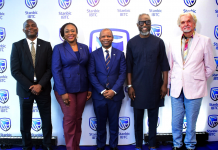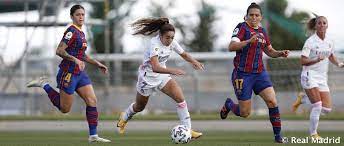Interest in the women’s game has steadily seen an uptick in recent years and Barcelona’s Femini’s recent clash with Real Madrid certainly proves this. Situated in the hallowed Camp Nou stadium, the match drew a historic crowd of 91,553.
The record surpassed the 1999 Women’s World Cup played in front of 90,185 fans at the Rose Bowl in California, USA. Tickets for the game, which Barca won 5-2 to progress to the semi-finals 8-3 on aggregate, sold out in just three days.
Over the years, women’s football has received a new lease of life. More teams are being created, competition prize money is being increased, female football stars are being marketed heavily. No longer is women’s football an afterthought; it has grown to be respected, and the sport is growing at an exponential rate.
We have seen big powerhouses like Real Madrid and Manchester United starting their own Women teams. English clubs like Arsenal, Chelsea, Tottenham have also allowed their respective women’s teams to play matches in the men’s stadium, Corporate bodies like Nike and Adidas have also signed female football stars to juicy boot contracts. This serves to prove a change in perspective – that the big clubs and corporate bodies are taking notice of a booming market.
The women’s El Clasico is not the only match that has drawn large crowds, the 2019 Women’s World Cup final attracted 57,900 fans; 77,768 England fans flocked Wembley for a friendly against Germany in November 2019, and just a few months after, 60,739 people watched Atletico Madrid play Barca Femini at the Wanda Metropolitano.
In 2018, The Ballon d’Or Féminin also known as the Women’s Ballon d’Or, an award that honours the best female football player on the planet was presented by France Football, with Ada Hegerberg of Norway women’s national football team becoming the inaugural recipient of the award. Alex Putellas of Barcelona Femini won the 2021 Women’s Ballon d’Or to spectacular fanfare.
The creation of the award was a key moment in women’s football history because it showed the legitimacy of the women’s game.
Women’s football is increasingly popular in Africa and Nigeria’s national women’s football team with recognisable names like Asisat Oshoala, Desire Oparanozie, Perpetua Nkwocha, Maureen Mmadu, among others. The Nigerian Women’s team is by far Africa’s most successful women’s football team at all age grades, with the Super Falcons (Nigeria Women Senior Team) winning a record 11 Africa Women Cup of Nations titles – their most recent title in 2018, after defeating South Africa in the final.
The Super Falcons remain the only women’s national team from Africa to have reached the quarterfinals in both the FIFA Women’s World Cup and the Olympics. The Super Falcons are part of an exclusive club in women’s football as they are one of the few teams in the world to have qualified for every edition of the FIFA Women’s World Cup.













































